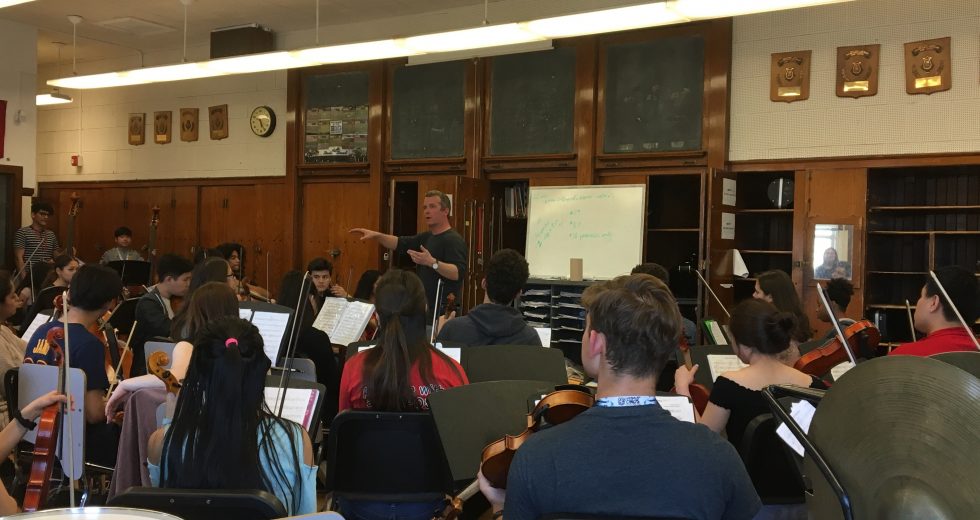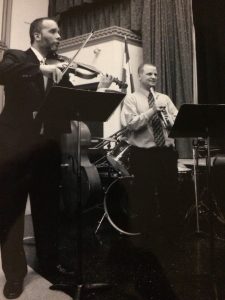
On Wednesday, May 30, at 7pm, musicians from the Civic Orchestra of Chicago, Amundsen High School Orchestra, and Chappell Elementary School beginner strings will perform along with a visual art exhibition created by the students. The art is in response to a Chicago Symphony Orchestra chamber ensemble performance that students attended earlier this school year. The forthcoming event will be hosted by Amundsen and their director of orchestras Sean Reidy, who recently spoke about his work as an educator as well as the impact his teachers had on his own musical and personal development. The Negaunee Music Institute at the CSO is currently working in partnership with Mr. Reidy and his students thanks to a grant from the Ingenuity Creative Schools Fund.
How did you begin your musical education?
I started music in 4th grade, and literally got to pick what I was going to play. I didn’t know there was anything I couldn’t play—that’s how strong the program was. I chose Eb alto saxophone, which I played for 15 years—in college, too. But I stopped playing it in high school because I didn’t want to have to march in my own football games. Then I started playing electric bass, and that’s what really got me going.
How did playing an instrument as a student give you a sense of community?
I was in a lot of different social circles. I had a lot a friends from football and music just got me with like-minded people. I really wanted to be around creative people.
I met all the older kids, who I idolized, who played in band. There was always this sense of non-competition because we made music together. I’d see them perform and they’d give us a shout out, or they’d come to our rehearsals, and we worshiped them. We were lucky—they were really incredible.

Amundsen High (CPS) Director of Orchestras Sean Reidy, left, promotes levity as teaching tool in his classroom.
How did playing music as a kid help you develop a sense of self?
When I was playing music in high school, everyone knew: “Reidy plays bass.” Everybody knew that music was my thing, and I loved that. It was definitely a huge part of my identity, especially because it made me go on to be a performance major in college and gave me that confidence.
Was there a particularly influential music teacher in your own development?
My elementary teacher from Elmhurst who recently passed away. In college, Scott Mason, who’s a jazz bass player in Chicago. And Stephen Lester from the CSO. He made me feel like I could do it. Even when I felt like I couldn’t, and it was laughable, he always encouraged me to do better. He never made me feel bad about it. He always made me feel like when I screwed up, I wasn’t being reprimanded by this CSO musician, he was just “Steve from Milwaukee.” Also, giving superfluous compliments like someone I worked with at VanderCook – I learned more about compassion from that dude than anyone. It’s the lessons that you take from each one of them.
And what I do now is a bad imitation of all of them. I think, “I’m being ‘this teacher’ right now.”
How old were you when you really understood what it meant to listen to others and play as part of an ensemble? How did this change you as a musician?
In college I had to learn that it’s not about me, it’s about my contribution to the ensemble. That’s a hard lesson for a kid who was playing bass in rock and fusion bands. At the beginning of college, I still didn’t get it. I was into flashy players, but it was poison for my playing because I was overplaying. All of a sudden I took a step back and got into Ron Carter, etc. I had to slow it down. I had to run before I walked.
My favorite bass players now barely play anything. They play fewer notes but it’s about the whole thing. Now I kind of get it.
How do you see your own students building community?
I really see the non-competition and the way they try to help each other. I really push that. I don’t do first chair, second chair in my orchestra. I don’t pit them against each other. The competition is not a good motivator in my school. The encouragement gets everybody along.
In the beginning it’s really ugly: trying to play an advanced piece, we have to muscle through it measure by measure. None of my kids takes private lessons so I have to find a way to get the most out of them every day. Every day. That’s the thing that helps: persistent effort every day.
If there’s one thing you hope your students take home from playing an instrument, what is it?
I want them to be lifelong patrons of the arts. I want them to know how to understand the role of performer and listener. Especially today: they don’t know that they’re not supposed to talk [at a concert]. What gets lost when you pull your phone out at a performance? I’m lucky to have lived before that. I want them to go back and take their kids to see the CSO. I’m probably not going to raise a Paganini. But they’re going to be hip people, be interested in good art, and be able to speak about what is and what isn’t good art.
On Wednesday, May 30, at 7pm, musicians from the Civic Orchestra of Chicago, Amundsen High School Orchestra and Chappell Elementary School beginner strings perform along with a visual art exhibition created by students responding to CSO Ensemble performance. These aactivities are made possible through an Ingenuity Creative Schools Fund Grant with Amundsen and Chappell.
TOP: Sean Reidy rehearses the Amundsen High School orchestra (2018).